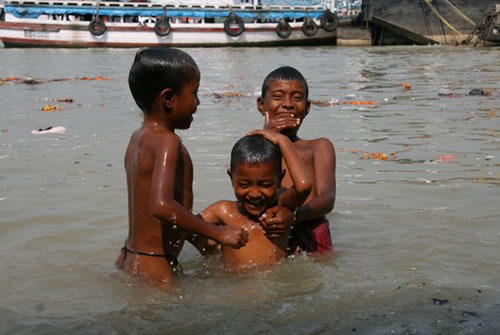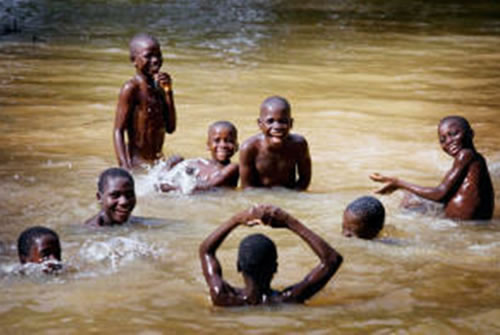Nov. 1999: “One who bathes willingly with cold water doesn’t feel the cold.” – Fipa (Tanzania) Proverb
November, 1999
Ichifulala ukasi chitisi kulemesha inzuusi. (Fipa)
Anayeoga maji kwa hiari yake hata hisi baridi. (Swahili)
One who bathes willingly with cold water doesn’t feel the cold. (English)
Fipa ( Tanzania ) Proverb

Background:
A few riders try to sit backwards on their horse and try to make it go in the direction that it is not going. Some counselors and pastoral caregivers try to do something similar to the people who engage them for help. And the results, as you might imagine, can be rather frustrating (and in the case of the horse, even comically so). Teachers in the marshal arts invite participants to stop wasting so much energy meeting an oncoming force head-on and instead try to capture the other’s momentum and turn it to one’s own advantage.
Those in training for pastoral care here at the Bugando Medical Centre in Tanzania are invited to welcome and to explore all of the negativity with which others confront them and to clarify the values and choices beneath the fears and resentments. The path leads through the fears and resentments and not around or against them.
Today one of our participants (who is a woman) tried to “comfort” an older male patient in the hospital by telling him, “Don’t cry.” She came to supervision with a sense of not having been the source of comfort that she would have liked. My task in supervising her training is to help her make friends with tears (hers and her patients) in order to let down and to help another to let down into a more comfortable place from which to live life. I try to find African proverbs that capture the wisdom of allowing the inevitable to take its course and the folly of resisting or avoiding what needs to be accepted and acknowledged in order to move on.
 Explanation:
Explanation:
Some Fipa (Tanzania) proverbs from the book “Methali za Kifipa” by Serenus John Rupia come to mind as pertinent and are able to serve a good purpose. One proverb that I use effectively in training programs is “One who bathes willingly with cold water doesn’t feel the cold.” In this proverb the positive benefit of choosing one’s fate or allotment is expressed. There is folly in resisting the cold water strenuously and thereby rendering its bitterness powerful. In pastoral counseling situations choosing tears, just like choosing cold water, will take the edge off the bitterness otherwise enhanced by resisting it. Try it and see.
Bible Parallels:
Biblical parallels are found in Jeremiah (20:7-9) who resists the chill of preaching doom to the Israelites and in Jonah (1:3) who fled to Tarshish to avoid a hard cold stance against the wickedness of the people of Nineveh. Both found the “awe-fullness” and power of their vocations from God futile to avoid. In the New Testament Peter resists the path of suffering and death that Jesus chooses (Matthew 16:21-23) only to find later that this is the way to life and the Good News for all. The Sadducees resisted the Apostles who preached this Good News and tried to detain them in jail (Acts 5:17-39). Gamaliel, a Pharisee in the Sanhedrin, saw the wisdom in letting “these men” be and having history take its course.
Similar Proverbs:
Other similar proverbs express the flip side or the negative effects of resisting one’s fate or allotment as in the saying “What one resists, always persists.” NOTE: One commentator states that this saying is an awesome example of how the mainstream suppresses emotions versus cultures that don’t.
Here are some other proverbs (all but one taken from Rupia’s collection) that express:
- The folly of resisting the inevitable:
- “You left an old woman on the road; you are now surprised to hear the sound of her stick at the door!” (p. 83)
- “Try as you may to hide a deadly disease, pain will reveal it.” (p. 86)
- “Nkukwe, come out of a dense forest, a secret that is known is not secret anymore.” (p. 87)
- “Try as you may to stop up a crack in a green calabash, when it gets dry it will crack once more.” (p. 87)
- The wisdom of letting fate take its course:
- “If you do not struggle when caught in a trap, you shall not be strangled.” (p. 89)
- “A meek dog is never beaten for pride.” (p. 98)
- “Do not shift your head for it must take the blow.” (p. 108)
- “To die like a sheep (uncomplainingly) is to die like a gentleman.”
NOTE: The writer welcomes other African proverbs on resistance. Please post other examples to our African Proverbs E-mail Discussion List or send to him directly.
Rev. John Eybel, M.M.
Clinical Pastoral Education, Bugando Medical Centre
Mwanza, Tanzania
E Mail: jeybel@mbio.net
